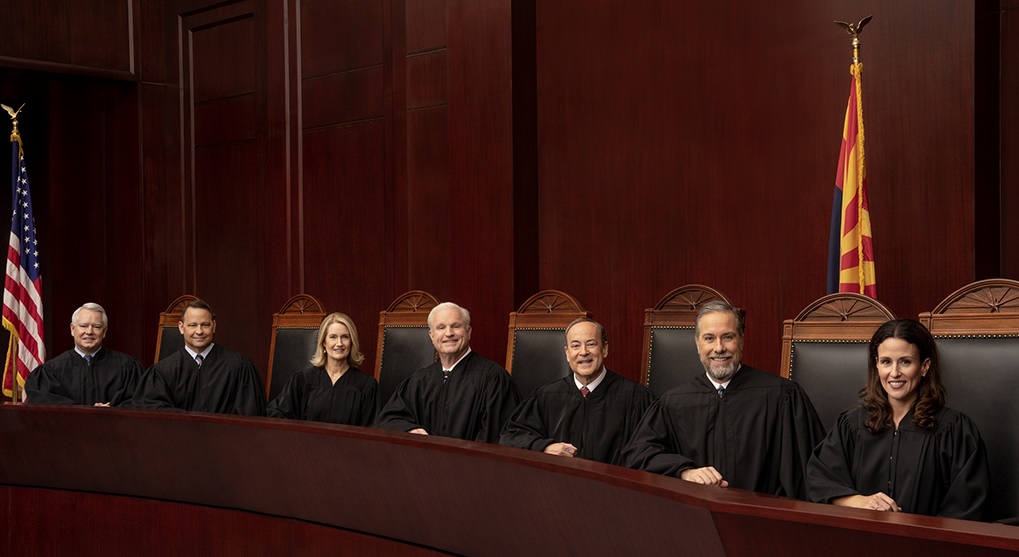The following article is from the National Right to Work Legal Defense Foundation’s bi-monthly Foundation Action Newsletter, March/April 2024 edition. To view other editions of Foundation Action or to sign up for a free subscription, click here.
So-called “official time” scheme puts tax dollars toward union politics, says Foundation brief
Foundation attorneys argue before the Arizona Supreme Court (above) and Texas Supreme Court that Janus’ ban on forcing public workers to fund union activities shows why state constitutions forbid the same coercion applied to taxpayers.
PHOENIX, AZ – The National Right to Work Foundation-won Janus v. AFSCME Supreme Court decision provided massive new protections for American public employees’ free association rights. In 2018, the Court recognized for the first time that forcing a public employee to pay union dues just to keep his or her job is a First Amendment violation.
The Janus decision, buoyed by National Right to Work Foundation follow-up enforcement actions, means today well over half a million public employees are free of mandatory union payments. Yet, the implications of Janus go even beyond the billions of dollars in previously mandatory dues payments that union bosses can no longer force workers to pay.
Underpinning the Janus ruling was Foundation attorneys’ core argument that all public sector union activities involve influencing the government, and are therefore inherently political speech. Because of this, Foundation staff attorneys now argue that applying Janus to the practice known as union “official time” or “release time” — where government union officials are paid tax money to conduct union business instead of government work — shows how the scheme violates multiple state constitutions.
Foundation Attorneys Bring Janus Expertise to Public Employee Lawsuit
In Arizona for example, Phoenix city employees Mark Gilmore and Mark Harder sued Phoenix mayor Kate Gallego in 2023 for engaging in a scheme that redirects taxpayer funds intended for public employees’ compensation toward political advocacy conducted by American Federation of State, County and Municipal Employees (AFSCME) Field II agents.
That case, Gilmore v. Gallego, is now before the Arizona Supreme Court, where Foundation attorneys filed a legal brief arguing that this so-called “release time” scheme violates Arizona’s Gift Clause, which forbids the government from paying out benefits to private parties that serve no public purpose.
The brief points out that, in Janus, the Supreme Court found that all government union bargaining is a form of lobbying designed to influence public policy for the benefit of the union. That means taxpayer subsidies of such union activities inherently violate the Arizona Constitution’s Gift Clause.
Phoenix’s Arrangement Pays Union Bosses to Lobby City
Phoenix’s “release time” scheme funnels taxpayer money into four full-time positions for union officials for the purpose of conducting union business, creates a bank of over 3,000 paid hours to be used by other union official employees for union purposes, and provides multiple other perks for union agents.
The policies unions lobby for “often are matters of substantial public concern, such as how much money the government expends on wages and benefits,” the Foundation’s brief reads. With its release time policy, the City is effectively paying individuals to lobby the City for a private advocacy organization and its members. The notion that this political advocacy serves a public purpose is untenable.”
Foundation attorneys are backing a similar lawsuit at the Texas Supreme Court. In Roger Borgelt v. City of Austin, Texas taxpayers are fighting a scheme that City of Austin officials are using to direct taxpayer dollars to Austin Firefighters Association union officials to conduct union business.
“Union bosses, who will often screech about ‘corporate welfare,’ are more than happy to arrange so-called ‘release time’ schemes in which taxpayer dollars are funneled toward supporting their massive lobbying efforts,” stated National Right to Work Foundation Vice President and Legal Director William Messenger. “Janus made it plain and simple that compelling public sector employees to fund union activities constitutes forced political speech, and courts everywhere have an obligation to declare such compulsion illegal when foisted on taxpayers.”







